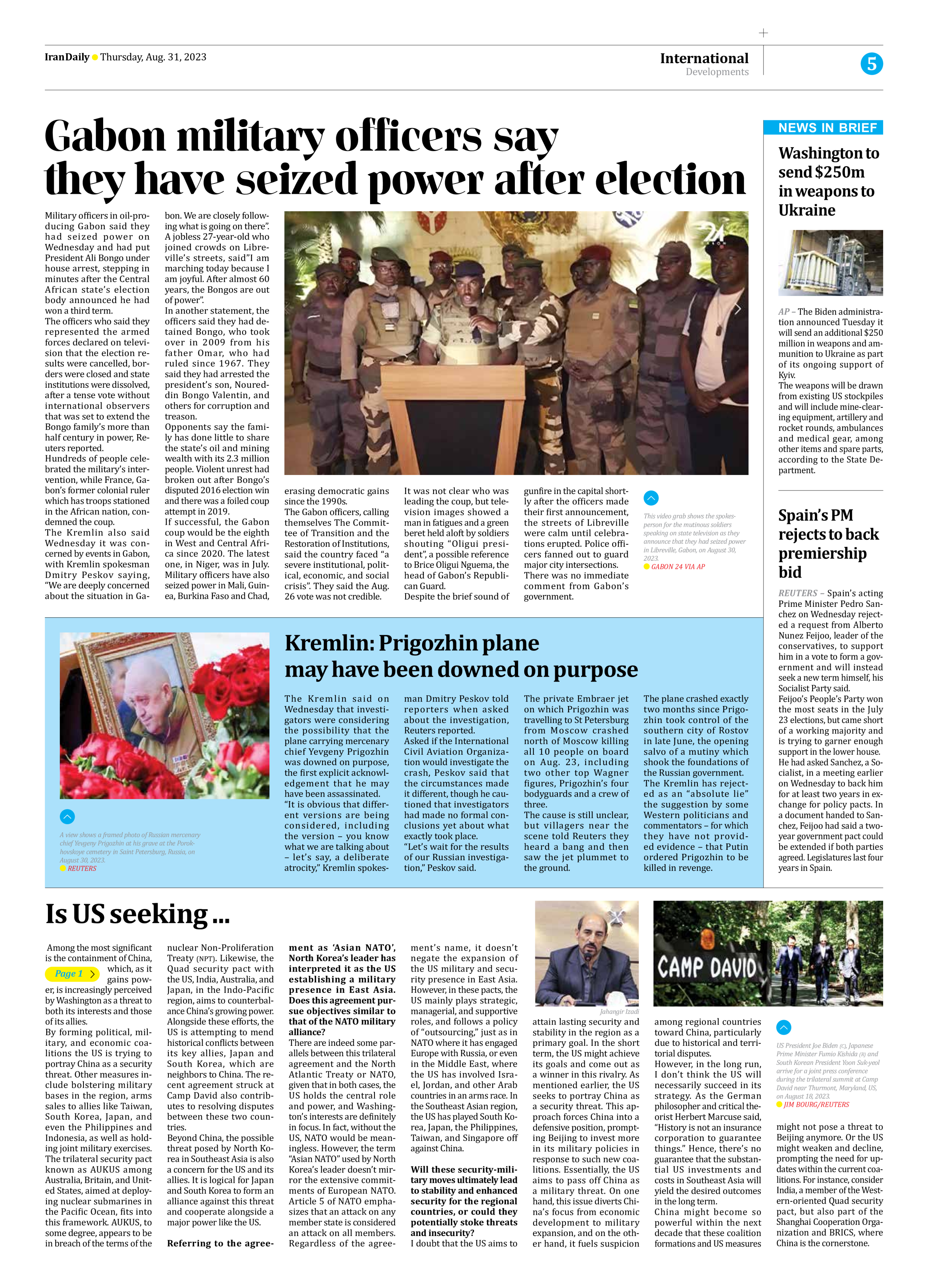
Is US seeking ...
Page 1
Among the most significant is the containment of China, which, as it gains power, is increasingly perceived by Washington as a threat to both its interests and those of its allies.
By forming political, military, and economic coalitions the US is trying to portray China as a security threat. Other measures include bolstering military bases in the region, arms sales to allies like Taiwan, South Korea, Japan, and even the Philippines and Indonesia, as well as holding joint military exercises. The trilateral security pact known as AUKUS among Australia, Britain, and United States, aimed at deploying nuclear submarines in the Pacific Ocean, fits into this framework. AUKUS, to some degree, appears to be in breach of the terms of the nuclear Non-Proliferation Treaty (NPT). Likewise, the Quad security pact with the US, India, Australia, and Japan, in the Indo-Pacific region, aims to counterbalance China’s growing power.
Alongside these efforts, the US is attempting to mend historical conflicts between its key allies, Japan and South Korea, which are neighbors to China. The recent agreement struck at Camp David also contributes to resolving disputes between these two countries.
Beyond China, the possible threat posed by North Korea in Southeast Asia is also a concern for the US and its allies. It is logical for Japan and South Korea to form an alliance against this threat and cooperate alongside a major power like the US.
Referring to the agreement as ‘Asian NATO’, North Korea’s leader has interpreted it as the US establishing a military presence in East Asia. Does this agreement pursue objectives similar to that of the NATO military alliance?
There are indeed some parallels between this trilateral agreement and the North Atlantic Treaty or NATO, given that in both cases, the US holds the central role and power, and Washington’s interests are definitely in focus. In fact, without the US, NATO would be meaningless. However, the term “Asian NATO” used by North Korea’s leader doesn’t mirror the extensive commitments of European NATO. Article 5 of NATO emphasizes that an attack on any member state is considered an attack on all members. Regardless of the agreement’s name, it doesn’t negate the expansion of the US military and security presence in East Asia. However, in these pacts, the US mainly plays strategic, managerial, and supportive roles, and follows a policy of “outsourcing,” just as in NATO where it has engaged Europe with Russia, or even in the Middle East, where the US has involved Israel, Jordan, and other Arab countries in an arms race. In the Southeast Asian region, the US has played South Korea, Japan, the Philippines, Taiwan, and Singapore off against China.
Will these security-military moves ultimately lead to stability and enhanced security for the regional countries, or could they potentially stoke threats and insecurity?
I doubt that the US aims to attain lasting security and stability in the region as a primary goal. In the short term, the US might achieve its goals and come out as a winner in this rivalry. As mentioned earlier, the US seeks to portray China as a security threat. This approach forces China into a defensive position, prompting Beijing to invest more in its military policies in response to such new coalitions. Essentially, the US aims to pass off China as a military threat. On one hand, this issue diverts China’s focus from economic development to military expansion, and on the other hand, it fuels suspicion among regional countries toward China, particularly due to historical and territorial disputes.
However, in the long run, I don’t think the US will necessarily succeed in its strategy. As the German philosopher and critical theorist Herbert Marcuse said, “History is not an insurance corporation to guarantee things.” Hence, there’s no guarantee that the substantial US investments and costs in Southeast Asia will yield the desired outcomes in the long term.
China might become so powerful within the next decade that these coalition formations and US measures might not pose a threat to Beijing anymore. Or the US might weaken and decline, prompting the need for updates within the current coalitions. For instance, consider India, a member of the Western-oriented Quad security pact, but also part of the Shanghai Cooperation Organization and BRICS, where China is the cornerstone.







